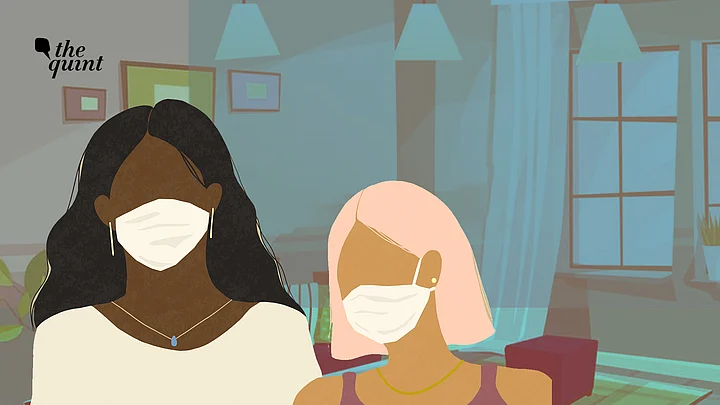In a press briefing on 26 April, Niti Aayog member and head of the COVID task force VK Paul said – “Please wear a mask, do not go out unnecessarily. Stay with your family. Even within the family wear masks.”
Paul went on to add that the time had come to start wearing masks at home, even otherwise.
“If there is a COVID case in the family, it is very important that the person wears a mask even indoors because the virus can spread to others in the house. I would rather go on to say that the time has come that we start wearing mask at home even otherwise.”Dr VK Paul, Member (Health), NITI Aayog
What is the rationale behind this recommendation? What do we know about indoor transmission? Read on.
Is the risk of COVID transmission higher indoors?
If this has to be answered in one word – yes!
A recent study published in the journal, Lancet, said that the COVID virus is primarily airborne and does not spread through droplets like it was previously thought.
What this means is that an individual could potentially be infected just by inhaling aerosols produced when an infected person exhales, speaks, shouts, sings, sneezes, or coughs. The aerosol containing the virus is capable of being suspended in air for hours, making it particularly infectious in poorly ventilated spaces.
Does 6-feet physical distancing help curb coronavirus at all?
These findings have been supported by other studies as well, including a recent study published by the Massachusetts Institute of Technology (MIT). They found social distancing of 6 feet to be ineffective in curbing infections indoors.
“The risk (of COVID transmission) is always higher in a close confined non-ventilated area, there is no doubt about that. This is because the circulation of air makes a huge difference.”Dr Rahul Pandit, Director-Critical Care Fortis Hospitals Mumbai
Moreover, he added that a couple of studies suggested “that when the droplets that fall onto surfaces dry up, because of the air there could be a circulation of the virus."
"That is where the concern arises. Airborne nature of the virus makes it a whole other ball game in terms of your personal protection and masks. This is where wearing masks indoors becomes important," he said.
Do I need to wear a mask at home? Even if no one in the house has symptoms of COVID?
"If you are in contact with people that you do not know whether they are infected or not, it makes sense to stay masked (even at home)," says Gagandeep Kang, Virologist, Vellore’s Christian Medical College.
“If anyone in your family has been in contact with other people who could be potentially infected and you want to be sure that they have not brought the infection home, it makes sense to wear a mask until you are sure that your family members have not been infected," she adds.
Since asymptomatic people could also be carriers, it can be difficult to know the status of the people we interact with.
“Considering the very high rate of infections we have right now, it only makes sense that for the next month at least, we take all precautions as much as we can,” Pandit added.
Is wearing masks inside homes mandatory in India?
Not yet. It is mandatory to wear masks in all public places in the country. But wearing masks inside the house, when no one is infected, is completely up to you.
When should you definitely wear a mask indoors?
Knowing what we know about the virus being airborne, Dr Pandit recommends wearing a mask at home if someone at home is suspected to have COVID like symptoms, or has come in contact with a COVID positive person.
It isn't enough to keep distance, because a virus that is suspended in air can travel easily. And the risk of transmission will depend on how well or poorly the space is ventilated.
Speaking to Hindustan Times, Dr Kang said "when that (infected) person, speaks, eats, sings, breathes in and out, she will be putting out viral particles even with the new infectious variant for about a week to nine days."
“We do practise it ourselves as well,” says Dr Pandit. “If someone in the house has COVID symptoms, we make sure to isolate that person, and that they as well as others in the house wear masks,” he added.
What has changed in the second wave?
The second wave of COVID in India has hit us with a severe ferocity. And the rapidly increasing cases has pushed healthcare experts to push for more stringent precautionary measures.
Dr Pandit said, "The second wave is so rapid that we need to take every possible care to make sure the cases come down."
According to Dr Kang, under less serious circumstances, wearing masks at home when no member of the family has symptoms of COVID may be unnecessary.
“This (wearing masks at home) applies at a time when there is very high transmission outside and you are really worried about the risk.”Gagandeep Kang, Virologist, Vellore’s Christian Medical College
What is the best way to protect yourself from getting infected?
Like every health expert that we've been speaking to, Dr Pandit reiterated, "The best way to protect yourself is to wear a mask whether you're indoors or outdoors, keep social distancing and maintain hand hygiene."
“Following COVID-appropriate behaviour very religiously for the next two weeks at least, is the only way we can hope to bring down the spike in numbers.”Dr Rahul Pandit, Director-Critical Care Fortis Hospitals Mumbai
(This was first published on FIT and has been republished with permission.)
(At The Quint, we question everything. Play an active role in shaping our journalism by becoming a member today.)
